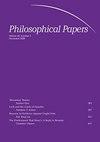数字工具与新冠肺炎:公私边界的转变
IF 1.3
3区 哲学
0 PHILOSOPHY
引用次数: 0
摘要
摘要在本文中,我们试图为讨论COVID-19导致的数字技术用于区分公共和私人领域的直接和长期后果提供起点。我们首先要澄清与隐私概念相关的公共和私人领域的定义。什么是私人的,至少在一定程度上是由习俗和社会、政治、经济和技术发展所决定的。从这个角度来看,我们开始批判性地评估新冠肺炎导致的新数字工具在生活的两个重要领域的大规模引入:工作场所和教育。我们讨论了技术的作用及其随之而来的直接法律或伦理挑战。论文最后对新冠肺炎疫情控制背景下使用数字工具对公共和私人领域划分可能产生的长期规范影响进行了思考。本文章由计算机程序翻译,如有差异,请以英文原文为准。
Digital Tools and COVID-19: Shifting Public–Private Boundaries
Abstract In this paper, we attempt to provide starting points for a discussion on immediate and longer term consequences of COVID-19-induced uses of digital technologies for the distinction of the public and the private spheres. We start with clarifying definitions of the public and the private spheres in relation to the concept of privacy. What is considered private is at least in part contextually determined by conventions and social, political, economic and technological developments. From this perspective, we set out to critically evaluate the COVID-19-induced large-scale introduction of new digital tools in two essential areas of life: the workplace and education. We discuss the role of technology and its immediate concomitant legal or ethical challenges. The paper concludes with reflections on the possible longer-term normative effects of the use of digital tools in the context of the COVID-19 containment on the demarcation of the public and private spheres.
求助全文
通过发布文献求助,成功后即可免费获取论文全文。
去求助
来源期刊

Philosophical Papers
PHILOSOPHY-
CiteScore
2.10
自引率
0.00%
发文量
18
期刊介绍:
Philosophical Papers is an international, generalist journal of philosophy edited in South Africa Original Articles: Articles appearing in regular issues are original, high-quality, and stand-alone, and are written for the general professional philosopher. Submissions are welcome in any area of philosophy and undergo a process of peer review based on initial editor screening and refereeing by (usually) two referees. Special Issues: Topic-based special issues are comprised of both invited and submitted papers selected by guest editors. Recent special issues have included ''Philosophy''s Therapeutic Potential'' (2014, editor Dylan Futter); ''Aging and the Elderly'' (2012, editors Tom Martin and Samantha Vice); ''The Problem of the Criterion'' (2011, editor Mark Nelson); ''Retributive Emotions'' (2010, editor Lucy Allais); ‘Rape and its Meaning/s’ (2009, editor Louise du Toit). Calls for papers for upcoming special issues can be found here. Ideas for future special issues are welcome.
 求助内容:
求助内容: 应助结果提醒方式:
应助结果提醒方式:


